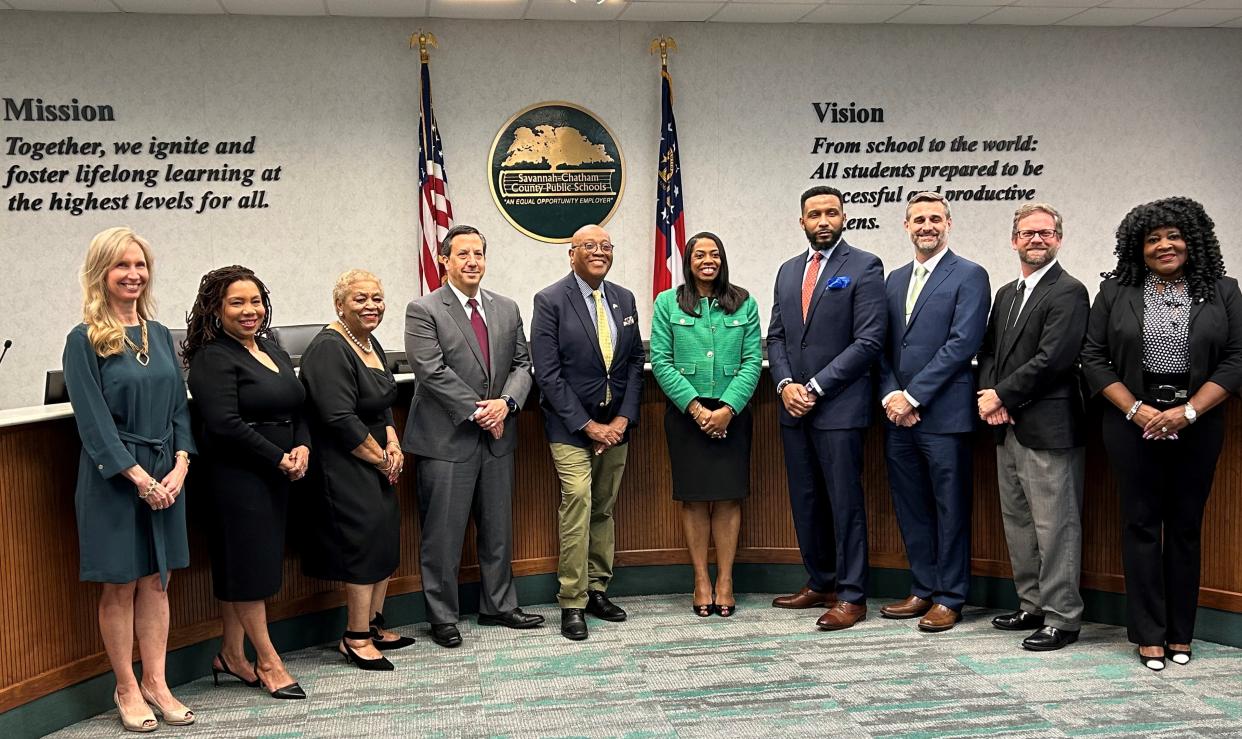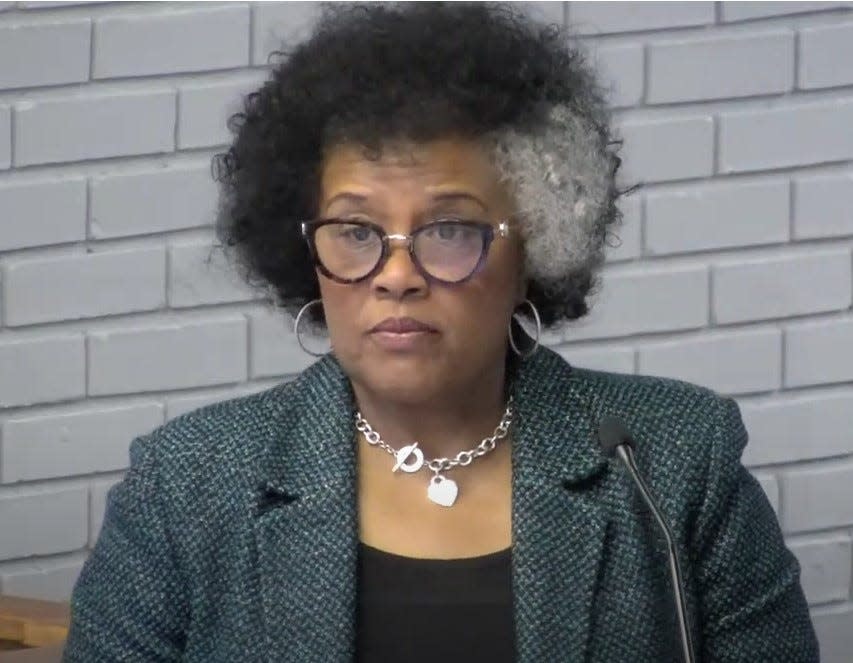Savannah public schools attendance report: Are there consequences for not showing up?

Editor's note: This article has been updated to print a correction. The previous version of this article stated that the School of Liberal Studies at Savannah High School's and Alfred E. Beach High School's average daily attendance fell below 50% and that Building Bridges Academy High School's daily attendance rate fell to nearly 30%. That information was inaccurate. Savannah Mornings has updated the article to reflect the number of students who have missed more than 10% of days enrolled, not the average daily attendance rate.
At the beginning of the March 6 Informal Session of the Savannah-Chatham County Public School System (SCCPSS) school board, District 8 representative Tonia Howard-Hall, who serves as the Academic Excellence Committee chairwoman, asked a question: “Are students achieving at the level necessary to be prepared for the next grade, college or career?”
She provided her own answer: “Not if they're not coming to school.”
According to the Georgia Governor’s Office of Student Achievement directory, in 2023, the state average number of students who were chronically absent (those who missed 15 or more days) was 23.2%. For SCCPSS, it was 28.2%.
SCCPSS students’ average daily attendance rate for the first half of the 2023-24 academic year was about 75%, according to recent reporting provided by the district’s Data and Accountability Division.
Districtwide around 25% of students enrolled missed nine or more school days within the first 90 days. In some schools, such as School of Liberal Studies at Savannah High School and Alfred E. Beach High School, about 50% of students had missed 10% or more of days enrolled. At Building Bridges Academy High School nearly 70% of students had missed 10% or more of days enrolled. The Student Attendance Semester 1 School Year 2024 report lists the percentages for each school in the district.
Attendance could trump literacy: Superintendent wonders if Savannah school system should have two North Stars

Why are so many students missing school?
The district calculates the total days a student is enrolled by using the enrollment date and number of school days as of the end of each quarter/semester. PreK students are not included in the district. Elementary School attendance is taken in the assigned homerooms, and secondary school attendance is based on whether students attended at least 50% the school day. All absences excused or unexcused are counted, including out-of-school suspensions.
The reasons given for missed schools days varied from from lack of transportation to school discipline measures to COVID-19 pandemic fallout to schools’ climates and cultures.
The statewide 2023 data shows that more SCCPSS students were missing five or more days than they were back in 2019. One factor that might be affecting that trend is the district's COVID protocol, which requires that a student isolate at home for five days from onset of symptoms or from a positive COVID test.
Board President Roger Moss was particularly bothered by the low attendance rates at SCCPSS's alternative programs.
Deputy Superintendent of Teaching and Learning Bernadette Ball-Oliver mentioned that prior to the COVID-19 pandemic, SCCPSS provided transportation for students who were sent to the alternative programs, which are often not in their neighborhoods. "But now when students are sent to the alternative schools, it is incumbent upon parents to transport them to and from school," she said.
She detailed solutions that are often discussed with families of students in the alternative programs such as the Chatham Area Transit (CAT) tickets and now its Student Zero Fare Pilot program. She also said SCCPSS's solution may be virtual learning for particular students where transportation is an issue.
Moss said, "I'm hearing us do a lot of work for these students. I'm not seeing them putting anything in and there's no consequence."
Superintendent Denis Watts interjected that students have told her that "post COVID and because of the over-reliance on technology, they don't necessarily feel like they have to be present to do well in school. Most of the learning has continued to be computer-based."
She cited students' comments about watching YouTube videos of teachers' lessons, finding their own resources and turning in assignments online as contributing to the attendance numbers.
The perception among students that there are no consequence to missing school may have to do with the district and state requirements for graduation being based more on course credits than attendance.
"You would think it would be reflected in their grades," Watts said.
As long as students pass a class and earn credit, however, then attendance does not have to factor in graduation or grade promotion. At the January Regular Board meeting District 6 representative David Bringman mentioned TWILIGHT and Summer School as two potential options for what he referred to as "credit recovery" options that high schools have to obtain the necessary credits to graduate outside of typical school hours.
Sept. was Attendance Awareness Month: Schools leadership promote attendance and provide literacy updates
How the district plans to get students back in class
Another data point of note from the district’s presentation was that three schools with some of the best attendance percentages in the district are choice program schools whose entire available seats are choice seats: Esther F. Garrison School of the Arts (highest attendance average of elementary and K-8 schools), the STEM Academy at Bartlett (highest attendance average of middle schools), and Savannah Arts Academy (second highest attendance average of high schools). Students at these schools clearly have an incentive to attend. They also likely have involved parents since the schools offer some of the most sought-after choice programs in the county.
Savannah Arts' Student Handbook states, “Consequences for excessive absences include detention and Saturday School. Students who are consistently absent from school are in violation of their Entrance Agreement and shall be withdrawn from enrollment.”
According to SCCPSS officials, though, there is no official policy on attendance requirements for students to remain in choice programs. The official indicated that Savannah Arts' statement is likely referring to the state's Student Attendance Protocol.
The SCCPSS Student Handbook states, "Any child subject to compulsory attendance who during the school calendar year has more than 10 days of unexcused absences is considered truant. Out-of-school suspension absences are not considered unexcused in determining truancy.” Possible consequences for truancy are:
conference with the student and/or parent/legal guardian
detention before or after school or on Saturday
ineligibility for or delay in applying for an instruction permit or driver’s license
referral to the school counselor or social worker
possible charges filed in juvenile court if student is under 16 years of age
possible charges against the parent/legal guardian in the appropriate court or withdrawal from school if the student is 16 years of age or older
Court penalties may include fines, community service, mandated counseling, mental health treatment, probation and incarceration.
So there are actual consequences, when pursued and applied by the district. Wednesday's presentation laid out the current and future strategies the district has employed and will employ in the coming months. One of the future strategies is to advance a countywide attendance campaign through the Attendance Matters communication initiative. The campaign will include newsletters, community partner involvement, prize patrols and student recognition incentives. Ball-Oliver also mentioned truancy sweeps. She said everyone from the superintendent to Savannah Mayor Van Johnson have agreed to knock on doors.
The transportation question remains
Despite the talk of out-of-school suspension and the district's need to make school more desirable for students, through such tactics as providing more engaging extra-curricular activities that align with students' interests, transportation remains an underlying issue.
District 4 Representative Shawn Kachmar pointed out that SCCPSS only has two schools that are at or above a 90% attendance rate, which is closer to the district's average pre-COVID. He suggested the district focus on students who are absent and who fall in the category of absent more than 10% of the entire days of school attended and who are low performing. Ball-Oliver and DiTommaso agreed to provide data related to GMAS performance correlated to students who are missing more school than others as well as out-of-school suspensions' impact on attendance numbers.
During the Informal Session, the district also presented a closer look at its operational strategies within the district's larger Strategic Plan. (At the board's Regular Meeting at 6 p.m. on Wednesday, members unanimously approved the district's revised strategic plan.) Within the operational strategies and tactics for Strategic Priority 4 Chief Financial Officer, Larry Jackson talked about enhancing transportation services. One solution he mentioned was the obtainment of six type A micro-buses (a 14-passenger bus). "This bus meets all the state of Georgia safety specifications as a school bus, but does not require a CDL license. The closing of this type of bus fleet will allow us to broaden the pool of driver applicants." The board later approved the purchase of the micro-buses for $687,024.00.
Kachmar, one of the longest serving board members, underscored the transportation issue by saying, "We need to pay drivers more money. We need to be more creative with recruitment and retention." He said the average starting pay for SCCPSS drivers is around $18 per hour while the ports, Amazon, FedEx and UPS have starting pay in the mid-$20s per hour range.
Joseph Schwartzburt is the education and workforce development reporter for the Savannah Morning News. You can reach him at JSchwartzburt@gannett.com.
This article originally appeared on Savannah Morning News: Savannah public school attendance data shows need for improvement

